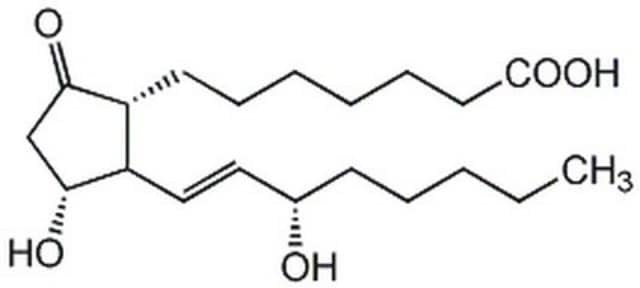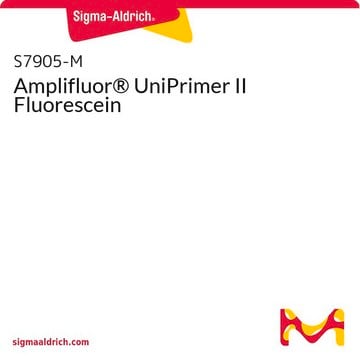P5390
Prostaglandin B2
≥98%, synthetic
Synonym(s):
(5Z,13E,15S)-15-Hydroxy-9-oxoprosta-5,8(12),13-trien-1-oic acid, PGB2
About This Item
Recommended Products
biological source
synthetic
Quality Level
Assay
≥98%
form
solution
solubility
ethanol: ~100 mg/mL
PBS, pH 7.2: ~2 mg/mL
DMSO: ~50 mg/mL
storage temp.
−20°C
SMILES string
CCCCC[C@H](O)\C=C\C1=C(C\C=C/CCCC(O)=O)C(=O)CC1
InChI
1S/C20H30O4/c1-2-3-6-9-17(21)14-12-16-13-15-19(22)18(16)10-7-4-5-8-11-20(23)24/h4,7,12,14,17,21H,2-3,5-6,8-11,13,15H2,1H3,(H,23,24)/b7-4-,14-12+/t17-/m0/s1
InChI key
PRFXRIUZNKLRHM-HKVRTXJWSA-N
Looking for similar products? Visit Product Comparison Guide
Application
Biochem/physiol Actions
Physical form
Preparation Note
Signal Word
Danger
Hazard Statements
Precautionary Statements
Hazard Classifications
Eye Irrit. 2 - Flam. Liq. 2 - STOT SE 3
Target Organs
Central nervous system
Supplementary Hazards
Storage Class Code
3 - Flammable liquids
WGK
WGK 2
Flash Point(F)
15.8 °F
Flash Point(C)
-9 °C
Personal Protective Equipment
Certificates of Analysis (COA)
Search for Certificates of Analysis (COA) by entering the products Lot/Batch Number. Lot and Batch Numbers can be found on a product’s label following the words ‘Lot’ or ‘Batch’.
Already Own This Product?
Find documentation for the products that you have recently purchased in the Document Library.
Our team of scientists has experience in all areas of research including Life Science, Material Science, Chemical Synthesis, Chromatography, Analytical and many others.
Contact Technical Service









